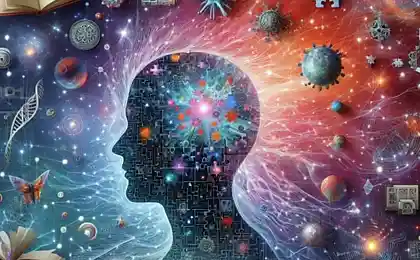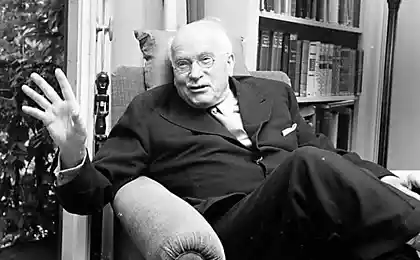514
4 nonsense, that's what people do
You consider yourself quite intelligent and thinking person? However, we are confident that once you've done this nonsense. Just because they do all...

Our brain is a strange and complicated mechanism. Sometimes he deliberately erases important information for us, sometimes deceives us. Of course, with the best of intentions. He just so easier and simpler to work with. And then we do something stupid, defend the truth, getting into trouble and agree on the worst and ignoring the best. All of these phenomena in scientific language are called "cognitive distortions". What are the most common mistakes we make?
"I know what he thinks" after a Quarrel with her husband, you declare him a boycott, gleefully thinking that he is going through and regretting it. But I was surprised to discover that her husband, as if nothing had happened, going fishing with friends, and even asks you to wash his favorite t-shirt. He forgot to think about the fight! How could he?! For instance, you place the husband was freaking out and nervous...
It is not that the husband at you is bad, but that everything we attribute to others their own thoughts and emotions. This phenomenon is called projection: we think that people just have to be awkward if in their place you would have experienced. What they should be offended when they call bad words (you would, for example, which was a shame).
Tip: because Of this cognitive distortion creates a lot of conflicts and misunderstandings. Instead to attribute to others their emotions, ask what they really feel.
"Everything is bad" the Day went rather well: you managed to cope with his work, drove home, avoiding traffic jams, bought a lot of Goodies for the family, talked with a friend. And on leaving the supermarket you have a broken heel! And here asked her husband how the day went, you reply, "Terrible, just terrible!"
But the fact is that our brain reacts more readily to negative events than to positive. And it has an evolutionary reason, because bad circumstances that came our ancestors, threatened their lives and health. Imagine a caveman who enjoys the sun, despite the fact that next to it there was a wild boar. Yes, the memory simply would not have survived if I practiced positive thinking!
Tip: have You noticed that you are sensitive to negative news than positive? Ask yourself: how negative events is dangerous for you, and what consequences they will have for you personally?
"I did everything right!" Recognizing your mistakes is the hardest thing in the world. Here, for example, you bought a ticket to the resort, and found out that I paid an exorbitant price, and a place to rest, not lucrece, and the service was great. Surely you will look for some pros: wonderful nature around, proximity to souvenir shops, or cute lifeguard on the beach. Anything, if only to justify! This is called rationalizing the purchase: our brain forces us to justify any, even the most stupid behaviour of some intelligence or illusory benefit.
Tip: Feel stupid? Analyze the causes and... admit what was wrong!
"But she's absolutely right!" Your friend is closest to you, man. You have the same views on men, you read the same books and go to the same boutiques. So when your not very close friend complains about the girlfriend, she's the wrong cut on the cottage lawn, you take the side of a friend: "This is a new word in the design, you do not understand this. And in General: why are you picking on her?" It is not that you will really like podrugki the lawn in the bare spots, and that people tend to protect "their" in front of "strangers". Even if "your" wrong.
Tip: Separate the "flies and cutlets". Try to develop critical thinking. Indeed, such cognitive dissonance can make you an obedient toy in the hands of the manipulator, which cunning will be rubbed to you in confidence.published
P. S. And remember, just changing your mind — together we change the world! ©
Source: my.goodhouse.com.ua

Our brain is a strange and complicated mechanism. Sometimes he deliberately erases important information for us, sometimes deceives us. Of course, with the best of intentions. He just so easier and simpler to work with. And then we do something stupid, defend the truth, getting into trouble and agree on the worst and ignoring the best. All of these phenomena in scientific language are called "cognitive distortions". What are the most common mistakes we make?
"I know what he thinks" after a Quarrel with her husband, you declare him a boycott, gleefully thinking that he is going through and regretting it. But I was surprised to discover that her husband, as if nothing had happened, going fishing with friends, and even asks you to wash his favorite t-shirt. He forgot to think about the fight! How could he?! For instance, you place the husband was freaking out and nervous...
It is not that the husband at you is bad, but that everything we attribute to others their own thoughts and emotions. This phenomenon is called projection: we think that people just have to be awkward if in their place you would have experienced. What they should be offended when they call bad words (you would, for example, which was a shame).
Tip: because Of this cognitive distortion creates a lot of conflicts and misunderstandings. Instead to attribute to others their emotions, ask what they really feel.
"Everything is bad" the Day went rather well: you managed to cope with his work, drove home, avoiding traffic jams, bought a lot of Goodies for the family, talked with a friend. And on leaving the supermarket you have a broken heel! And here asked her husband how the day went, you reply, "Terrible, just terrible!"
But the fact is that our brain reacts more readily to negative events than to positive. And it has an evolutionary reason, because bad circumstances that came our ancestors, threatened their lives and health. Imagine a caveman who enjoys the sun, despite the fact that next to it there was a wild boar. Yes, the memory simply would not have survived if I practiced positive thinking!
Tip: have You noticed that you are sensitive to negative news than positive? Ask yourself: how negative events is dangerous for you, and what consequences they will have for you personally?
"I did everything right!" Recognizing your mistakes is the hardest thing in the world. Here, for example, you bought a ticket to the resort, and found out that I paid an exorbitant price, and a place to rest, not lucrece, and the service was great. Surely you will look for some pros: wonderful nature around, proximity to souvenir shops, or cute lifeguard on the beach. Anything, if only to justify! This is called rationalizing the purchase: our brain forces us to justify any, even the most stupid behaviour of some intelligence or illusory benefit.
Tip: Feel stupid? Analyze the causes and... admit what was wrong!
"But she's absolutely right!" Your friend is closest to you, man. You have the same views on men, you read the same books and go to the same boutiques. So when your not very close friend complains about the girlfriend, she's the wrong cut on the cottage lawn, you take the side of a friend: "This is a new word in the design, you do not understand this. And in General: why are you picking on her?" It is not that you will really like podrugki the lawn in the bare spots, and that people tend to protect "their" in front of "strangers". Even if "your" wrong.
Tip: Separate the "flies and cutlets". Try to develop critical thinking. Indeed, such cognitive dissonance can make you an obedient toy in the hands of the manipulator, which cunning will be rubbed to you in confidence.published
P. S. And remember, just changing your mind — together we change the world! ©
Source: my.goodhouse.com.ua
A worldwide conspiracy against cannabis
By 2018, Tesla will release 4 new models of electric vehicles























